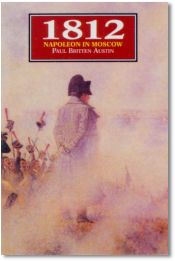
1812 NAPOLEON IN MOSCOW by Paul Britten Austin |
| At the gates of Moscow, Napoleon's Grand Army prepares to
enter in triumphal procession. But what it finds is a city abandoned by its inhabitants
-save only the men who emerge to fan the flames as incendiary fuses hidden throughout the
empty buildings of Moscow Set the City alight. For three days Moscow burns, while looters
(lodge the fires to plunder and pillage. And so begins 1812: Napoleon in Moscow, Paul
Britten Austin's atmospheric I word- film 'presented through the testimony of more than
100 of the people who Witnessed and Look part in the campaign. A large proportion Of these close-up accounts have never been seen in English before. After the fires die down the army Settles in the ruins of Moscow. For five weeks Napoleon waits at the Kremlin, expecting his 'brother the Tsar' in St Petersburg to capitulate and make peace, while in fact the Russian Army is gathering its strength. At the same time Murat's cavalry, the advance guard, is encamped in dreadful conditions three days' march away at Winkowo, where it is being Starved to death. When Napoleon eventually realises the futility of 11 is plans and prepares to leave Moscow, his advance guard is surprised by a Russian attack and tumbles head over heels Out Of its Position. The most astounding exodus in modern times ensues. Trailing thousands of wagons and carriages laden With all the stupendous loot Of MOSCOW, the Grand Army moves slowly south in an attempt to outflank the Russian General Kutusov. At Malo-Jaroslavetz, 100km from Moscow, it runs headlong into ten of Kutusov's divisions, and its 'conquest of the world' comes to an end with the shock of Napoleon himself narrowly escaping capture by Cossacks. 1812: Napoleon in Moscow follows on from the brilliant 1812: The March on Moscow, which took Napoleon's army across Europe to the great city. Paul Britten Austin brings this next phase of the epic campaign to life With characteristic verve, creating a sense of immediacy through the words of the participants themselves. KEY POINTS: • Vivid recreation of events • Seen through the eyes of the participants and told with their words • Self-contained sequel to 1812: The March on Moscow REVIEWS: 'A closely-knit and totally compelling account Of this huge endeavour as seen by the French and their allied participants ... from Napoleon to the private soldier ... for conveying the sheer realism of human experience there can surely be no comparable literary technique to be found in use today.' - The British Army Review on 1812: The March on Moscow '...The 1812 campaign was the single most important cause of Napoloen's downfall. Austin's volumes are a magnificent contribution to the history of that mighty enterprise.' - Andrew Uffindell, Military History '...It is relatively rare these days to discover a publisher who will issue a trilogy on Military History. Mind you, Greenhill Books is currently being brave enough to re-publish Sir Charles Oman's seven volumes of A History of The Peninsular War (1902-1930)...but it must be unique for a full trilogy on a single year's historical campaign of one army, and its allies...once the third element of the trilogy is published, a saga of 1812 will be complete. A brilliant description will be the result. Britten Austin will almost certainly have accomplished the equivalent of Abel Gance's silent epic and masterpiece of 1927. More than that cannot be said.' - British Army Review |
|